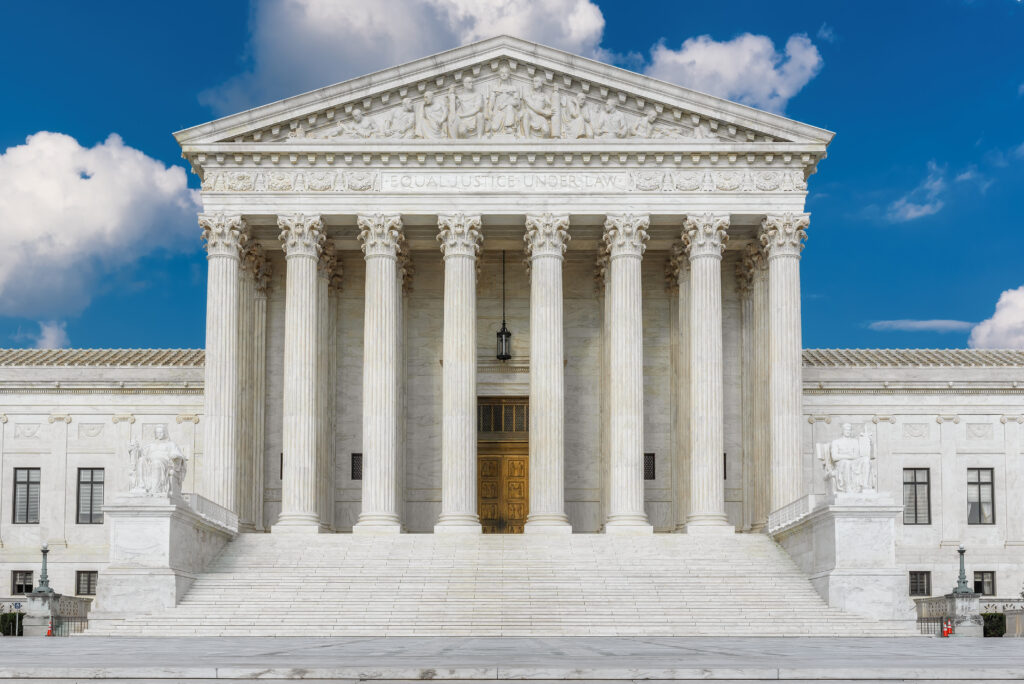US Supreme Court Denies Petitioners in Louisiana Redistricting Case Emergency Relief
UPDATE: From Feb. 5-9, 2024 the district court will hold a hearing on a new congressional map for 2024. Each side will be allowed to present one remedial map.
WASHINGTON, D.C. — On Thursday, Oct. 19, the U.S. Supreme Court denied pro-voting parties’ emergency applications, which asked the Court to pause and reverse a ruling from the 5th U.S. Circuit Court of Appeals that could delay the implementation of a fair congressional map in Louisiana. In late September, two ultra-conservative judges on the 5th Circuit canceled a hearing that was supposed to cover a new congressional map that would comply with the Voting Rights Act (VRA). However, as the date of the canceled hearing has already passed, today’s order does not change the status quo of the case.

How did we get here?
Today’s order stems from Ardoin v. Robinson, a case challenging Louisiana’s congressional map under Section 2 of the VRA. The Black voters and civil rights organizations that brought the case against Louisiana’s congressional map argue that Black voters can only elect their candidate of choice in one of the state’s six congressional districts even though Black residents of Louisiana compose 33% of the total population and vote cohesively as a bloc. The lawsuit alleges that by failing to include a second minority-opportunity district, the map dilutes the voting strength of Black voters in violation of Section 2 of the VRA.
In June 2022, a federal district court blocked Louisiana’s map for likely diluting the voting strength of Black Louisianans in violation of Section 2 of the VRA and ordered the state to adopt a new map with a second majority-Black district. Republican officials appealed this decision to the Supreme Court and requested emergency relief, arguing that the Louisiana case “presents the same question as” the Alabama case, Allen v. Milligan. The Court granted the Republicans’ requested relief and paused the decision blocking Louisiana’s map while also holding the case pending the outcome of Allen.
After Allen, the U.S. Supreme Court reinstated an order blocking Louisiana’s congressional map for diluting the voting strength of Black voters, paving the way for Louisiana to redraw its congressional map with a second majority-Black district. Since litigation was paused while Allen was pending, the lawsuit did not yet make it to the remedial stage, the stage where the blocked map would be replaced with a new, fair map.
After the decision temporarily blocking the map was reinstated by the Supreme Court, Republican officials asked the district court to cancel its hearing scheduled for Oct. 3-5, but the district court declined their request. The court found that the only remaining issue was to choose a congressional map and the court had adequate time to do so. Having exhausted the legal avenues available to further delay the implementation of a fair map, Louisiana Republicans filed one last Hail Mary in the 5th Circuit.
Instead of appealing the district court order that denied their request to cancel the hearing, Republican officials filed a request for mandamus in the 5th Circuit to order the lower court to cancel its hearing. (A writ of mandamus is a court order compelling a certain action.) This motion was heard by a different panel than the one currently considering Republicans’ appeal of the preliminary injunction decision.
On Sept. 28, two conservative judges appointed by former Presidents Ronald Reagan and Donald Trump, effectively pulled the brakes on Louisiana voters’ attempt to put a fair map in place for 2024 by issuing a writ of mandamus that canceled a hearing that would have determined how Louisiana’s likely Section 2 violation would be remedied and what congressional map would be in place for 2024. However, there was oral argument in the 5th Circuit on if Louisiana’s map will remain blocked for 2024 on Oct. 6. We are now awaiting that decision.
The petitioners who brought the lawsuit asked the Supreme Court to pause the 5th Circuit mandamus order arguing that the 5th Circuit’s order “suffers at least three fatal flaws” and “reflects a series of egregious mistakes that must be corrected.” In addition to their request to pause the 5th Circuit’s order, the petitioners also requested that the Supreme Court reverse the order. However, today the Supreme Court declined to do either.
Does today’s order change the posture of the case?
Today, in an unsigned order, the Supreme Court denied pro-voting parties’ requests to void the 5th Circuit’s decision. However, as the date of the canceled hearing has already passed, today’s order does not change the status quo of the case.
In her concurrence, Justice Ketanji Brown Jackson wrote that “nothing in our decision not to summarily reverse the Fifth Circuit should be taken to endorse the practice of issuing an extraordinary writ of mandamus in these or similar circumstances.” Currently, the case is still pending in both the 5th Circuit and the district court and as Jackson points out “the District Court will presumably resume the remedial process while the Fifth Circuit considers the State’s appeal of the preliminary injunction.”
Learn more about the case here.
Learn more about how the U.S. Supreme Court grants emergency relief here.